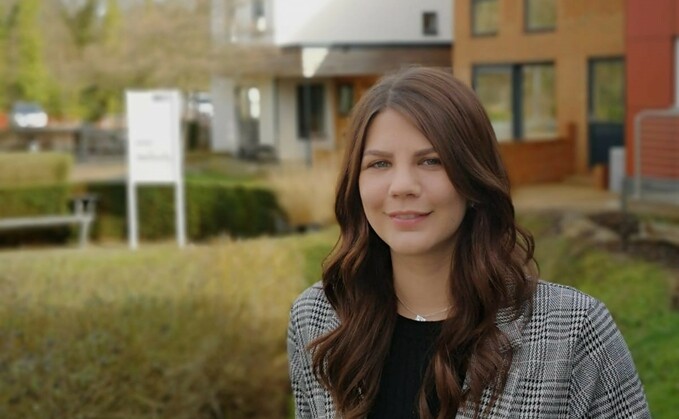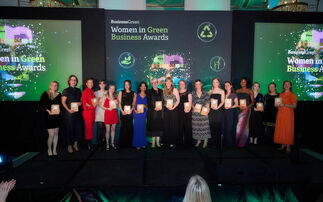
BSI's Kerri-Emma Dobson on purpose-driven organisations, net zero priorities, and the crucial role of green standards
Kerri-Emma Dobson, is group sustainability brand proposition manager at the British Standards Institution (BSI), the national standards body for the UK. The BSI is a major provider of technical standards and certifications on a wide range of products and services, including a growing number of sustainability-related topics. It is also a finalist in this year's UK Green Business Awards.
BusinessGreen: What parts of the green economy are you most excited about?
Kerri-Emma Dobson: There is a huge amount of progress being made across the green economy, and it's heartening to see many businesses recognising that supporting people and planet does not come at the cost of growth.
At BSI, we're excited about the opportunity for purpose-driven organisations (PDOs) to play their part in accelerating progress towards a better society and more sustainable world. These are organisations focused on contributing to a sustainable future through managing and caring properly for all resources and stakeholders. By putting sustainability ambitions and the increasingly urgent needs of people and planet at the heart of strategy and operations, PDOs can play a role in addressing pressing societal challenges from achieving net zero to establishing a water secure future.
Being purpose-driven sits at the heart of a flourishing green economy. PDOs can benefit society and the environment while growing their business because consumers have an appetite for brands that live up to their purpose. Indeed, BSI research found that younger consumers are especially attuned, with nearly three in four 18 to 24-year-olds considering purpose when making purchasing decisions.
To help organisations reassure consumers and embed genuine purpose-driven decision-making as widely as possible, BSI developed a globally applicable standard (PAS 808:2022), which sets out the how organisations can align with these principles.
At BSI our purpose has driven Our Journey to Net Zero, where we have publicly committed to achieving net zero in our own operations by 2030. We have also embarked on a water security campaign, Thirst for change, where in partnership with leading NGO Waterwise we drive understanding of water insecurity and seek to identify actionable steps that can drive positive change.
What developments do you think are currently on the radar?
Net zero is clearly on the agenda, which is fantastic. BSI's Net Zero Barometer 2024 found the majority of businesses (83 per cent) are committed to achieving the UK's legally binding net zero emissions target. While action is slower in some places, there is a clear acknowledgement that this matters.
At the same time, there are other developments that are on radar but deserve greater attention than they're currently receiving. BSI polling last year showed 44 per cent of SME leaders placed clean water access among the top issues to focus global resource on, suggesting organisations are interested in this but that more can be done. Achieving water security is as time critical as achieving net zero, with research suggesting that without action society could run out of much needed freshwater resources by as early as 2040.
We believe the net zero and water security goals are intrinsically linked, water systems being a major source of global greenhouse gas (GHG) emissions. Despite this, we don't see water security receiving the same amount of attention as the challenge of net zero. It doesn't need to be one or the other - both net zero and water security are time-critical issues at need to be on our radar.
As a purpose-led organization focused on accelerating progress towards a sustainable world, we are committed to using our profile and resources to amplify both the need to achieve net zero and a water secure future. Through our campaign Thirst for change, in partnership with Waterwise, we have sought to inform individuals and organizations looking to drive progress on water stewardship. Equally, in Our Journey to Net Zero we share BSI's best practices and lessons learned to support our partners on their journey.
What is the biggest misconception about the green economy?
This biggest misconception about the green economy is that it isn't achievable. If we partner across society, we can drive change for both people and planet, and organisations in the green economy can thrive. Equally, there is this assumption that doing the right thing comes at a cost, when in reality green businesses can be well-placed to grow as a result of these decisions. In BSI's 2024 Net Zero Barometer, it was notable that 48 per cent of businesses said reducing costs was the key incentive to pursuing net zero, an increase on the two-fifths who suggested this last year, suggesting a growing understanding of the economic impact of sustainability measures.
Another key misconception is the lack of trust in businesses looking to do the right thing. Certainly, some sustainability efforts and claims can be unsubstantiated, and greenwashing is clearly a concern. The use of standards, target, reporting and assurance initiatives can foster consistency, and provide accountability and evidence for sustainability commitments. Through these methods, individuals, governments and organizations can partner to drive the green economy and accelerate progress towards a sustainable world. A good example of this is Morrisons, with whom we recently partnered to certify their eggs as carbon neutral. A rigorous evaluation process was followed to receive this certification, and consumers can now trust in their claims.
What do you see as the biggest challenges in the net zero transition?
The BSI Net Zero Barometer 2024 found that more businesses today believe they're capable of achieving net zero by 2050, 73 per cent today compared to 68 per cent back in 2021.
This increasingly positive outlook from organizations is promising and presents several opportunities for organisations and wider society alike, such as mitigation against climate risks, economic growth and job creation, fostering innovation and utilising AI.
However, the net zero transition is not without its obstacles. Over the last four years, the BSI Net Zero Barometers have consistently found cost of transition raised as a hurdle to organisations achieving their net zero goals. In the 2024 Net Zero Barometer, 47 per cent of organisations still report that cost is preventing their organization from taking action to achieve net zero, either entirely or to a greater extent.
Another barrier cited by organisations in the 2024 Net Zero Barometer[KD12] is lack of clarity from government. Uncertainty over current and future policy commitments was the second most significant obstacle after cost, at 38 per cent and 35 per cent respectively.
For SMEs and micro-businesses, there are clearly specific challenges. Only 45 per cent of SMEs have set up, or are in the process of setting up, a team dedicated to implementing their net zero strategy, compared to 71 per cent of larger organisations. Likewise, only 47 per cent of microbusinesses[KD14] have a net zero strategy, compared to 72 per cent of larger organisations. But at BSI we see this as an opportunity for larger organisations to partner with SME suppliers to share resources and best practices, such as in BSI's Our Journey to Net Zero.
What do you see as the biggest challenges in achieving water security?
BSI research, in partnership with Waterwise, Thirst for change found that while water is abundant on earth, just one to three per cent is freshwater of which only 0.5 per cent is considered accessible. Alongside this, annual global water use has increased by around 3,500 billion square metres globally in the last century. Competition over water resources, climate related impacts and disasters and the lack of collaboration, policies and financing all pose obstacles.
Again, however, we do not believe these challenges are insurmountable. There are steps we can take to increase water circularity through global collaboration and innovation. To help society meet this challenge, we can do things like make it easier for consumers to choose water-saving products. Further research commissioned by BSI and the National Centre for Social research found that a globally agreed approach to water stewardship could also have a significant positive impact.
With water provision accounting for around 10 per cent of global carbon emissions, and the potential for drought to impact as many as 75 per cent of the world's population by 2050, ensuring a water secure future should be as much of a priority as addressing climate change.
There is some evidence to suggest organisations are starting to take positive steps with regards to water use, with more organisations beginning to set water use targets, and implementing new and more efficient methods of water management. To further accelerate progress on water security, organisations can engage in water stewardship, measure, set targets and report on their water footprint, and collaborate with supply chains and stakeholders.
Tell us about your work to advance the green economy?
A key priority for BSI is accelerating progress towards a better society and a sustainable world. Advancing the green economy means profound change alongside practical problem-solving - on climate, quality of life, and far more besides. There's urgency in every aspect of the drive for sustainability. Achieving net zero, enabling ethical workplaces and supply chains, and protecting people and planet, are high priorities for us.
Our approach at BSI is to recognize that no individual, organisation or country can meet these objectives alone. So at BSI we create impact by getting people together: thinking, working and innovating. A sustainable future and a truly green economy is achievable, and we are using our unique expertise, history and convening power to accelerate its arrival, for the benefit of everyone.
Having produced the world's first environmental management standard in 1992, we've since led the way in developing and launching new, certifiable standards around areas including energy management, sustainable finance and sustainable events. We recently certified the IMF's annual spring meeting to the latter; a major milestone.
Today we help organisations identify and manage the impact of their operations on the environment and community, understand relevant legislation, and most importantly use resources more efficiently by implementing powerful policies across the organisation.
The scale of the challenge can sometimes seem daunting, but BSI helps organisations move forward. By working collaboratively and partnering across society, we can accelerate progress toward a sustainable world.
What projects or achievements are you most proud of?
At BSI we are proud to walk the talk, demonstrate integrity and engender trust. We aim to be a sustainability leader, using sustainability-centric standards and our own commercial solutions where possible. We're particularly proud to have publicly committed to achieving an ambitious Net Zero 2030 target in our own operations and share our journey, best practice and lessons learned in Our Journey to Net Zero.
Partnering for progress is also extremely important to BSI, and we are proud to have bought urgent global attention to water insecurity within the broader climate conversation through our collaboration with Waterwise, Thirst for change.
What can the green economy do to better promote its success?
At BSI we believe collaboration and partnerships can accelerate progress towards a sustainable world. To better promote sustainability and success within the green economy, organisations can partner and share best practice through storytelling and demonstrating impact on successful sustainability interventions. In addition to this, providing assurance that businesses are implementing sustainable practices in a way that can be verified and trusted by their stakeholders is critical. Many aspects of sustainability are unregulated, and therefore to avoid accusations of ill intent (or "greenwashing") that additional trust gained from following international best practices via standards or assurance is invaluable.
What would your green superpower be?
Bringing people together! BSI has a wealth of experience finding solutions and developing consensus.
Our independence and impartiality, tempered by real-life input and peer-reviewed science all built around the need to reach net zero, makes us a leading partner for any organization or country wanting a better world.
We have a sustainability strategy that focuses our efforts on the areas where we can have the biggest impact internationally, in areas like GHG management, sustainable infrastructure, and modern-day slavery. But beyond these general themes, our organisation is structured to best address emerging and ongoing issues in key sectors around the globe. This means that we can take a generalised topic like GHG emissions and run it through the lens of a specific sector, like the Built Environment, Manufacturing, Food and Retail, to make much more meaningful progress, and have a far greater impact.
BSI is a partner of the UK Green Business Awards 2024.








